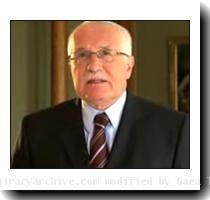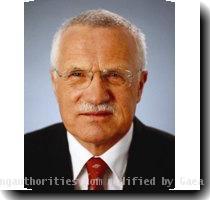Czech court lifts last legal hurdle to EU reform treaty, rules it is in line with constitution
By Karel Janicek, APTuesday, November 3, 2009
Czech court lifts last legal hurdle to EU treaty
PRAGUE — A Czech court struck down a complaint against the EU reform treaty on Tuesday, removing the proposed charter’s last legal hurdle and intensifying pressure on President Vaclav Klaus to sign it.
The Constitutional Court’s chief judge, Pavel Rychetsky, said the Lisbon Treaty, which has already been ratified by other member nations, “does not violate the (Czech) constitution.”
At the end of the ruling, whose reading took almost two hours, Rychetsky said all formal obstacles for ratification “are removed.”
Klaus is the last obstacle to the full ratification of the treaty, which is designed to transform Europe into a more unified and powerful global player. The charter, which was bogged down in negotiations for almost a decade, has been ratified by all other 26 EU nations.
Klaus was due to hold a news conference at 1500 GMT (11 a.m. EDT).
In Brussels, European Commission President Jose Manuel Barroso said he was “extremely pleased” with the verdict.
“I hope that we can now move forward as quickly as possible on the nomination of the president of the European Council and vice president of the Commission High Representative,” he said, referring to the newly-created post of president, who will chair EU summits, and the bloc’s new foreign policy chief, who will represent the EU abroad.
Jerzy Buzek, president of the European Parliament, said he was confident Klaus would sign the treaty, adding it should now enter into force by the end of the year.
Klaus was awaiting the Brno-based court’s ruling before deciding whether to endorse the treaty.
British Prime Minister Gordon Brown said he hoped that would happen “very soon.”
“It is high time for us to leave the internal reform discussions behind us,” said German Foreign Minister Guido Westerwelle.
Czech Prime Minister Jan Fischer welcomed the court’s verdict.
“The last hurdle has been cleared,” Fischer said, adding that he expects Klaus to sign the treaty.
The court was asked to rule by a group of senators who filed a motion arguing the treaty was not in line with the constitution. Last year, the court dismissed a similar complaint.
Failure of the treaty would send the EU into an unprecedented crisis. Negotiators say its reforms — creating a new EU president post, giving more power to the foreign policy chief and streamlining EU decision-making — are needed to make the EU more effective.
Last week, EU leaders agreed to Klaus’ last-minute demand — an opt-out from the treaty’s Charter of Fundamental Rights in return for his signing of it. Klaus said he was not planning to make any further demands.
The Czech leader asked for the option over worries of property claims by ethnic Germans stripped of their land and expelled after World War II.
But it was considered Klaus had used the demand for the opt-out to try to scuttle ratification of the treaty, which he opposes. He fears the treaty would hand over too many national powers to EU institutions in Brussels.
Associated Press writers Robert Wielaard and Constant Brand in Brussels, David Stringer in London and Geir Moulson in Berlin contributed to this report.
Tags: Czech Republic, Eastern Europe, Europe, Foreign Policy, International Agreements, Prague, Vaclav Klaus

